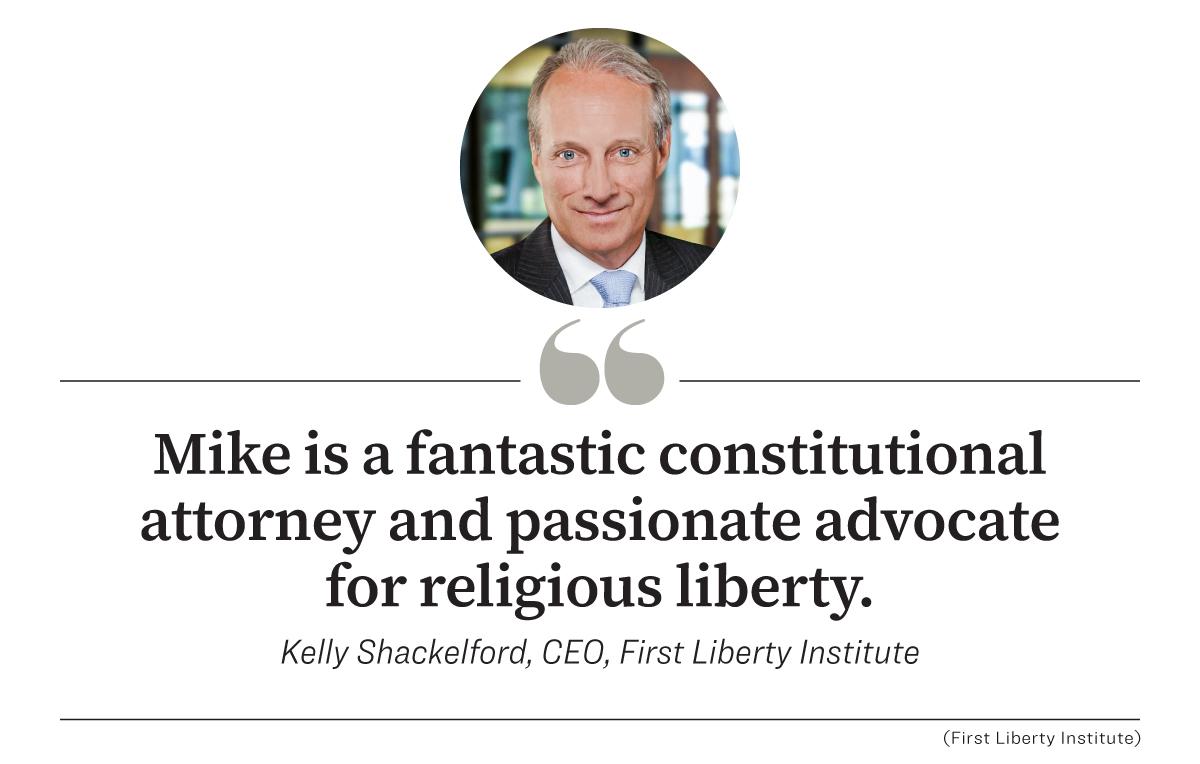
By Mark Tapscott

The unusual path of a Louisiana congressman, described as a man ‘with no enemies,’ who suddenly became speaker of the House.
Eyebrows were raised when newly elected Speaker of the House Mike Johnson (R-La.) in his first address from the chair reminded the assembled Democratic and Republican members of the House of Representatives that the God of the Bible raised up each one of them for a purpose.
“I want to tell all my colleagues here what I told the Republicans in that room last night: I don’t believe there are any coincidences in a matter like this. I believe that scripture, the Bible, is very clear that God is the one that raises up those in authority. He raised up each of you. All of us. And I believe that God has allowed and ordained each and every one of us to be here at this specific moment,” the Louisiana Republican said.
“This is my belief. I believe that each one of us has a huge responsibility today to use the gifts God has given us to serve the extraordinary people of this great nation, and they deserve it.”

Those who know Mr. Johnson, a devout conservative Southern Baptist, however, weren’t surprised by his allusion to verses in the Bible such as Daniel 2:21 that say the Creator raises up and deposes of political leaders: “He changes times and seasons; he removes kings and sets up kings; he gives wisdom to the wise and knowledge to those who have understanding.”
A former Louisiana state representative who is now serving in his fourth term in Congress, Mr. Johnson, 51, and his wife, Kelly, have four children. Before his remarkable rise to the speakership, Mr. Johnson had served as chairman of the Republican Study Committee (RSC), which describes itself as “the intellectual arsenal of conservatism in the House.” In addition, he was elected in January 2021 to a second term as vice-chairman of the House Republican Conference and he was a deputy whip under then-Speaker Kevin McCarthy (R-Calif.).
Prior to his political career, Mr. Johnson was the first member of his family to graduate from college, with a bachelor’s in business administration from Louisiana State University (LSU) in 1995 and a law degree from LSU’s Paul M. Herbert Law Center in 1998. He was elected president of the Christian Legal Society at LSU and subsequently became a successful constitutional law litigator.
Following the speakership decision, Kelly Shackelford, president, CEO, and chief counsel for the Plano, Texas-based First Liberty Institute (FLI), said of his former FLI litigator, “Mike is a fantastic constitutional attorney and passionate advocate for religious liberty.” Mr. Johnson also spent time as senior counsel for the Alliance Defending Freedom, which—like FLI—is a public interest law firm devoted to defending First Amendment religious freedoms.

The Man Is ‘Not Bashful’
Asked by The Epoch Times if he was surprised by Mr. Johnson’s reference to God’s role in raising up political leaders, Family Research Council President Tony Perkins chuckled, saying: “Not at all, that’s Mike. He’s not bashful.”
The Louisiana Republican’s campaign for the speakership was “through prayer, not politics,” Mr. Perkins said. He has known Mr. Johnson for 25 years as a student, a state legislative colleague, and pro-family, pro-life advocate.
Something certainly seemed miraculous about Johnson’s sudden and unexpected emergence from the chaos and disruption that gripped the House Republican Conference in the wake of successive failures by Majority Leader Steve Scalise (R-La.), Whip Tom Emmer (R-Minn.), and House Judiciary Committee Chairman Jim Jordan (R-Ohio) to secure enough Republican votes to become Speaker.
Mr. Johnson opposed the ouster of former Speaker Kevin McCarthy (R-Calif.), then lined up as a loyal supporter of Mr. Scalise, Mr. Jordan, and Mr. Emmer. He was mentioned in some news reports as a dark horse contender leading up to the Oct. 23 GOP Conference meeting that featured nine aspirants. Yet it was Rep. Byron Donalds (R-Fla.), going into that gathering, who seemed poised to move into a commanding position.
However, it was Mr. Johnson’s sincerity, as well as his substantive and reasonable responses to the tough questions aimed at all of the contenders by House Republicans, that won them over, according to a knowledgeable congressional source who was present throughout the meeting.
“He consistently, and comparatively, when a lot of members were asking just an onslaught of questions—wonky, policy questions—gave substantive answers versus the other candidates, who essentially gave answers about their personality or their personal background outside of being legislators,” the source told The Epoch Times.
“Johnson consistently came back to ‘This is my track record as a legislator; let me point you to my seven-point plan; let me point you to my proposed schedule if I become speaker,’ so that was really strong. And at the end of the day, Johnson really doesn’t have any enemies, and that’s in part due to his character and in part to his shorter time in Congress,” the source continued.
The source further noted that “probably a third of his answers to the questions involved scripture references.”

Rep. Mike Johnson (R-La.) speaks during a press conference after his election as House speaker, on the steps of the U.S. Capitol in Washington on Oct. 25, 2023. (Madalina Vasiliu/The Epoch Times)
But Mr. Johnson is anything but the stereotypical Bible-thumping fundamentalist. When asked what was the key to Mr. Johnson’s win, another senior congressional source who asked not to be named described it in two words: “No enemies.”
Mr. Perkins agreed: “He’s a brilliant guy, very smart, passionate. You saw classic Mike Johnson on the floor today. It’s principled, but he has relationships on both sides of the aisle that are not policy or politically driven. He cares about people. People have conversations with him, he prays with his colleagues.”
In addition to his faith, Mr. Johnson is a classic Reagan conservative with a distinctly populist accent. On his official website is listed the congressman’s “Seven Core Principles of Conservatism,” which include individual freedom, limited government, the rule of law, peace through strength, fiscal responsibility, free markets, and human dignity.

Of that latter principle, Mr. Johnson explains: “Because all men are created equal and in the image of God, every human life has inestimable dignity and value, and every person should be measured only by the content of their character. A just government protects life, honors marriage and family as the primary institutions of a healthy society, and embraces the vital cultural influences of religion and morality.
“Public policy should always encourage education and emphasize the virtue of hard work as a pathway out of-poverty, while public assistance programs should be reserved only for those who are truly in need. In America, everyone who plays by the rules should get a fair shot. By preserving these ideals, we will maintain the goodness of America that has been the secret to our greatness.”
Confidence From Former Speaker
Former Speaker Newt Gingrich told The Epoch Times that Mr. Johnson is “very conservative in his voting, he’s almost identical with Jordan, but at the same time, he’s very moderate and pleasant as a person, so he’s broadly acceptable to the moderates because in their districts he doesn’t send an automatic signal of being so conservative that it makes it hard for them to get re-elected.”
Mr. Gingrich also expressed confidence about the new speaker’s ability to lead the razor-thin Republican majority of 221, versus 212 House Democrats.
“At the same time, among the conservatives, there is a huge consensus that he is very reliable, very smart and deeply, personally conservative. … He’s shown an ability to calmly and quietly rise in the system without leaving any scars and without making any enemies,” Mr. Gingrich said.

The Georgia Republican is confident that the new speaker will follow through on House procedural reforms demanded by House Freedom Caucus members that Mr. McCarthy had only partially implemented, especially including restoring “regular order” in how the lower chamber of Congress conducts its daily business.
“Having somebody who is more comfortable decentralizing, and the degree to which he is very explicit about it is very helpful because what it does is it puts the burden on the committee chairmen rather than the Speaker,” Mr. Gingrich said. “So he can say to people, ‘Go talk to your chairman, I would love to help you and if you can convince the chairman, I’ll be glad to help you.’ That diffuses the center of energy and anxiety away from him.”
Even so, the road ahead for the new speaker will not be easy. His first order of business following his election was to secure passage of a bipartisan resolution of support for Israel in its response to the barbaric Oct. 7 attack from Gaza City by the Hamas terrorist group that killed more than 1,400 men, women, and children, including at least 30 Americans slaughtered and more than 220 hostages taken.

A digital billboard welcomes U.S. President Joe Biden to Israel, in Tel Aviv on Oct. 18, 2023. During his visit, President Biden met with Israeli Prime Minister Benjamin Netanyahu and President Isaac Herzog, as well as the families of hostages taken by the Hamas terrorist group. (Leon Neal/Getty Images)
There is also the question of what to do with President Joe Biden’s “urgent supplemental” request for $105 billion in mostly military aid to Ukraine, Israel, and other U.S. allies around the world. House Republicans will push to separate the $14 billion intended for Israel for a separate vote, and there are likely to be big fights over what and how much to give to Ukraine, which is mired in its second year of trying to repel a destructive and deadly Russian invasion.

But the biggest and most immediate challenge facing Mr. Johnson is moving eight remaining major appropriation bills, then going into conference committee clashes with the Democrat-led Senate, in an effort to get compromise legislation on President Biden’s desk before Nov. 17.
That’s the date when government funding runs out under the Sept. 30 continuing resolution backed by Mr. McCarthy and which led to his ouster. One of the outstanding spending bills is the massive $886 billion National Defense Authorization Act, which passed the House earlier this year but which still requires a Senate conference.
There’s also a $100 billion farm bill needed to refund multiple programs, including the Supplemental Nutritional Assistance Program, or food stamps, and numerous farm subsidies for crops and equipment purchases.
“Sooner or later, on a number of these things, there will be compromises. He will not be able to get all 221 Republicans, they will end up having to have some Democrats,” Mr. Gingrich said. “The question then will be, will people say, ‘Yeah, that was a reasonable process and that was the best outcome we could get at the present time,’ or will they say, ‘He’s selling us out just like the other guys.’ That will be the key moment in defining his speakership.”
Having a speaker who starts with no enemies may prove to be the best possible outcome of the House crisis that began a few weeks ago.


